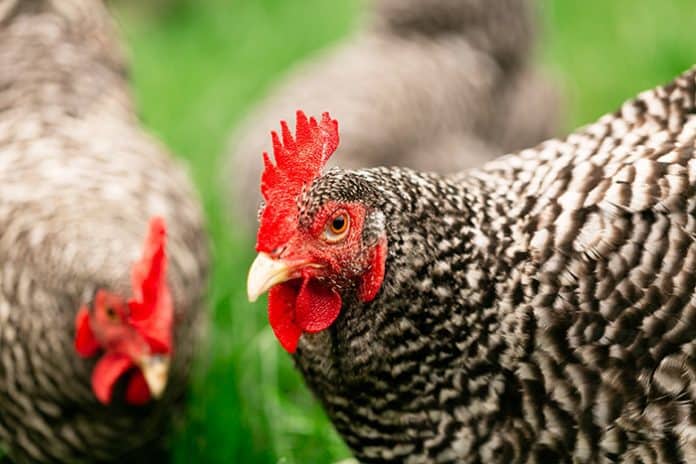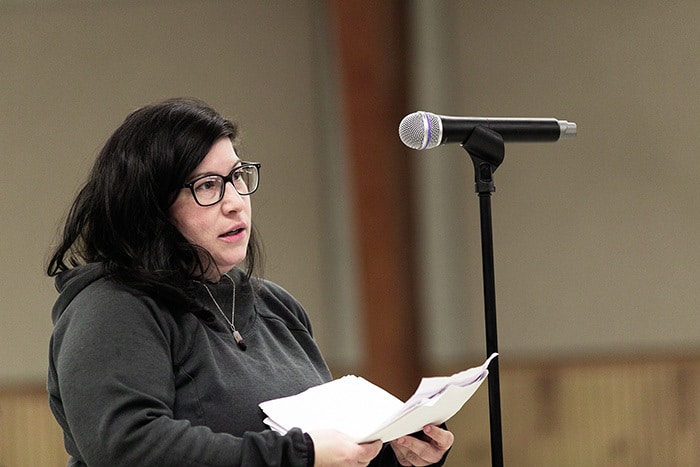
LAKEHURST – The Borough Council is considering how to make the raising of chickens safe and regulated, but the residents who raise the chickens are worried about the government infringing on their rights.
The Council’s Dec. 6 regular meeting, self-described “Chicken Lady” Alana Scott raised concerns with the ordinance and how it would affect those who have been quietly raising chickens without government involvement all along.
Council had introduced and then scrapped a first draft of the ordinance weeks ago, when concerns were voiced about it including a prohibition on other fowl, as well as possibly excluding those in duplexes of raising chickens. Council President Steven Oglesby said, instead, a separate ordinance will address other fowl. The newly written proposed ordinance, introduced Dec. 6, also makes allowances for those in duplexes to have chickens.
Scott first objected to Lakehurst’s ordinance being what she felt was nearly verbatim to the ordinance adopted in Camden County, but Oglesby said while it was modeled on their ordinances—the most current and three revisions—the borough’s ordinance addresses Lakehurst’s unique needs.
While Oglesby said he had been in contact with local chicken raising organizations, Scott said she and others were upset no one reached out to them to discuss the creation of this ordinance.

“We, as the chicken people, haven’t heard anything, so we were a little bit upset about it. That’s why I’m up here right now,” Scott said, standing at the mic. “It’s a little bit confrontational to us, because we feel that you should have contacted us personally, and got a group of us together instead of two or one. So that’s where we’re at with this whole ordinance.”
Mayor Harry Robbins said the borough will be putting together a volunteer board – the chicken advisory board – comprising residents of the borough, which is spelled out in the proposed ordinance.
If adopted, the ordinance would allow chickens to be kept in the borough’s R-1, R-2 and R-3 zones. Residents will pay a $10 per household license fee each year, which expires December 31 annually. First-time applicants must take a class on raising chickens; while commercial establishments and 4-H Clubs offer those, the details of what classes will be acceptable will be worked out once the ordinance is adopted and Chicken Advisory Board formed.
Chickens must be kept in a coop and can only be let out to roam under the supervision of someone 18 years old or older. While the borough is not forcing anyone to get rid of any chickens or roosters they may own now, new roosters are prohibited, and keepers must provide three-square-feet per chicken, and the coop must not exceed 25 percent of yard space.
“The intent of the ordinance is to make certain there are adults ultimately supervising the day-to-day operation of backyard chickens,” municipal attorney Sean Gertner said. “It’s not on an individual basis.”
Coops and runs must be kept clean and built in a way, and food stored in such a way, to keep out rodents and other predators. The chickens are not allowed to roam onto neighboring properties.
Any complaints will be first addressed to the volunteer Chicken Advisory Board. If disputes cannot be settled there, code enforcement will be brought in.

It’s unknown right now how many people in the borough are raising chickens, but Oglesby said there are more than anyone on Council realized.
“There are three goals for this ordinance, and this needs to be repeated, yes, a lot of times, because too many people aren’t hearing it,” Oglesby said. “Number one is, the safety of people. Because Salmonella and other issues, if someone is doing it wrong, or badly, it’s too easy for things to get way out of hand. This now gives the borough the mechanism to address that issue if it should happen.
“The second is, to promote the safety and the welfare of the chickens. We don’t want overcrowding. We don’t want bad things to happen. None of the serious chicken owners want that either. So it’s just to make sure it gets done properly.
“And the third is,” Oglesby concluded, “to encourage backyard chicken raising. It is not a discouragement in any way. That’s why the fee is minimal, $10 a year.”
“It came to a point where there needed to be some structure and regulation,” Gertner added.
The borough plans to overhaul all its ordinances in 2019, so the raising and keeping of other animals will be addressed at some point, Oglesby said.






